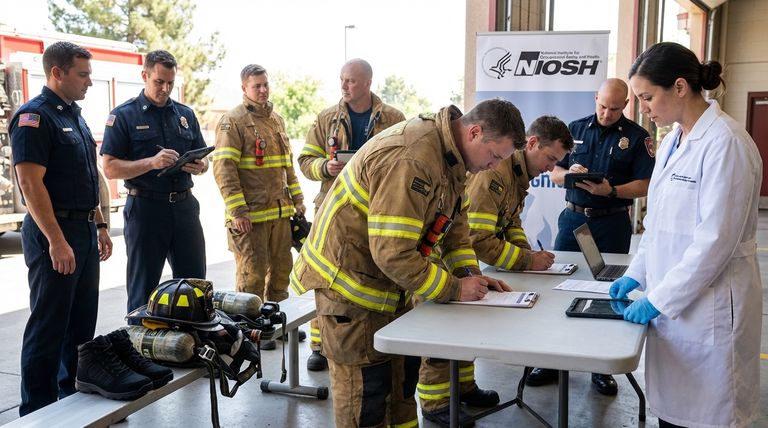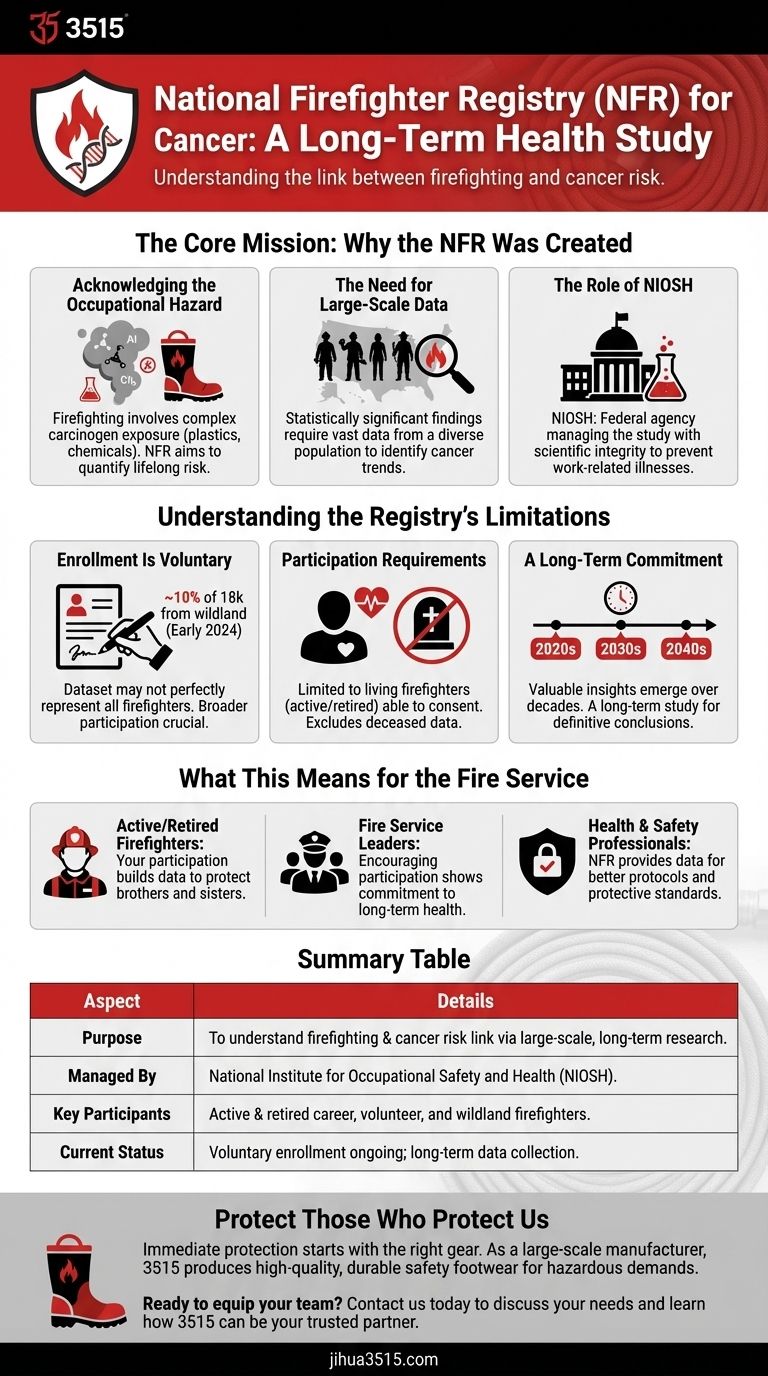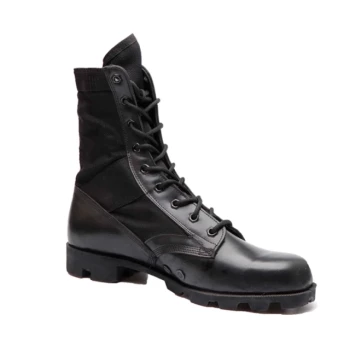In short, the National Firefighter Registry (NFR) for Cancer is a long-term health study created to better understand the link between firefighting and an increased risk of cancer. Established in 2018 by the National Institute for Occupational Safety and Health (NIOSH), it systematically collects work history and health information from firefighters across the country to create a robust dataset for scientific analysis.
The core purpose of the NFR is to move beyond anecdotal evidence and conduct large-scale, long-term research. By tracking thousands of firefighters over many years, it aims to provide definitive data that can drive improvements in safety protocols, equipment, and health support for the fire service.

The Core Mission: Why the NFR Was Created
For decades, firefighters have suspected their occupational exposures put them at a higher risk for cancer. The NFR was established by an act of Congress to scientifically investigate this link with the rigor and scale necessary to produce conclusive results.
Acknowledging the Occupational Hazard
Firefighting involves exposure to a complex mix of carcinogens released from burning materials, including plastics, chemicals, and other synthetic products.
The NFR aims to quantify the risk associated with these exposures over an entire career, providing the data needed to formally recognize and address these dangers.
The Need for Large-Scale Data
To produce statistically significant findings, researchers need vast amounts of data from a diverse population. A national registry is the most effective way to achieve this.
By including thousands of participants, including career, volunteer, and wildland firefighters, the NFR can identify cancer trends that might be invisible in smaller, localized studies.
The Role of NIOSH
The National Institute for Occupational Safety and Health (NIOSH) is the federal agency responsible for conducting research to prevent work-related injuries and illnesses.
As a trusted, non-biased scientific body, NIOSH is uniquely positioned to manage this sensitive health data and ensure the research is conducted with the highest degree of scientific integrity.
Understanding the Registry's Limitations
While the NFR is a critical step forward, it's important to understand its inherent challenges. The design of any large-scale, voluntary study involves trade-offs that affect the scope and speed of its findings.
Enrollment Is Voluntary
The registry relies on firefighters to sign up and provide information voluntarily. This means the dataset may not perfectly represent the entire U.S. fire service.
As of early 2024, for example, about 10% of the approximately 18,000 enrollees were from the wildland firefighting community. Broader participation from all sectors is crucial for comprehensive results.
Participation Requirements
Currently, participation is limited to living firefighters (active or retired) who are able to provide consent. This is a necessary ethical requirement but excludes data from those who may have already passed away from cancer.
A Long-Term Commitment
The most valuable insights from a registry like the NFR will emerge over decades. It is not a short-term project but a long-term commitment to tracking health outcomes over time.
Definitive conclusions about specific types of cancer and their links to specific exposures will take many years of patient data collection and analysis.
What This Means for the Fire Service
The NFR is more than a database; it is a tool for change. The information gathered has the potential to fundamentally improve the health and safety of future generations of firefighters.
- If you are an active or retired firefighter: Your participation helps build the data needed to protect your brothers and sisters in the service.
- If you are a fire service leader: Encouraging participation in the NFR demonstrates a commitment to the long-term health and well-being of your members.
- If you are a health and safety professional: The NFR will eventually provide the most definitive data available to inform new safety protocols and advocate for better protective standards.
By consolidating data on a national scale, the NFR provides the scientific foundation needed to protect those who protect our communities.
Summary Table:
| Aspect | Details |
|---|---|
| Purpose | To understand the link between firefighting and increased cancer risk through large-scale, long-term research. |
| Managed By | National Institute for Occupational Safety and Health (NIOSH). |
| Key Participants | Active and retired career, volunteer, and wildland firefighters. |
| Current Status | Voluntary enrollment ongoing; long-term data collection project. |
Protect Those Who Protect Us
The health and safety of first responders is a community-wide priority. While the NFR focuses on long-term health research, immediate protection starts with the right gear.
As a large-scale manufacturer, 3515 produces a comprehensive range of high-quality, durable footwear for distributors, brand owners, and bulk clients. Our production capabilities encompass all types of safety boots and shoes designed to meet the rigorous demands of firefighting and other hazardous occupations.
Ready to equip your team with reliable safety footwear? Contact us today to discuss your needs and learn how 3515 can be your trusted partner in safety.
Visual Guide

Related Products
- Durable Mid-Cut Tactical Boots for Wholesale & Private Label
- Durable Military Combat Boots with Water Drainage for Wholesale & OEM
- Wholesale Classic Leather Lace-Up Ankle Boots for Brand Manufacturing
- Dial Closure Leather Business Casual Shoes for Wholesale & Private Label
- Wholesale Modern Comfort Shoes with Dial Closure for Private Label & Bulk Orders
People Also Ask
- How do industrial-grade RFID tags improve recycling efficiency? Boost Footwear Circularity with Data-Driven Logistics
- Why are Elastic Resistance Bands integrated with Vibration Platforms in footwear testing? Stress-Testing Performance
- What are some branded materials used in advanced shoemaking technologies? Unlock Peak Performance with Gore-Tex & Vibram
- Which type of boot is better for those on a budget? Find the Best Value for Your Needs
- Why is synthetic fleece a high-risk microplastic source? Understand Fiber Shedding in Outdoor Gear
- Why is the development of high-performance biodegradable fibers critical? Unlocking Footwear Sustainability & Quality
- Why are plantar pressure insole sensors used to measure the gravity transfer effect of lower limb exoskeletons?
- What are the industrial advantages of using screen printing to integrate sensors onto non-woven fabrics? Scale Smart Tech








